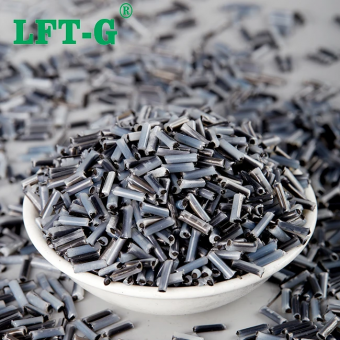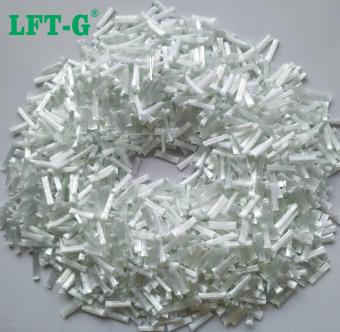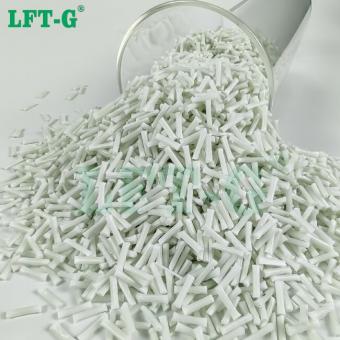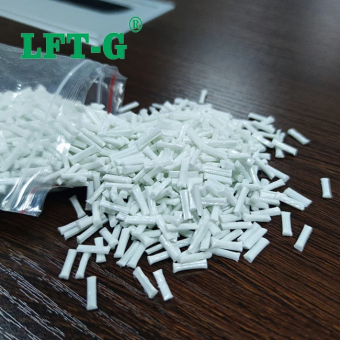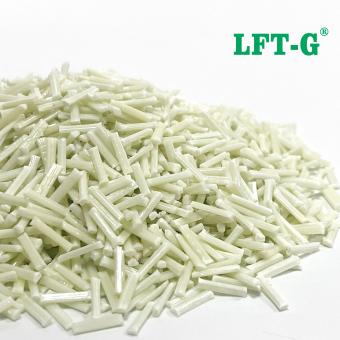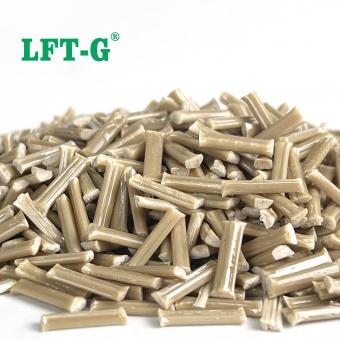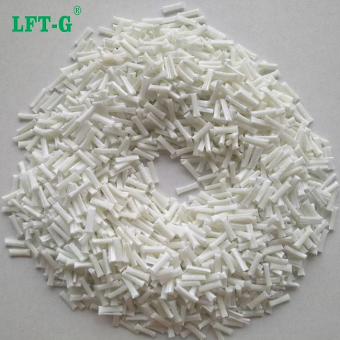Long carbon fiber is a new material with high strength and high modulus and excellent mechanical properties. It is a microcrystalline graphite material obtained by carbonization and graphitization of organic fibers. Its specific gravity is less than 1/4 of steel, and its strength is higher than that of steel. Corrosion resistant, high modulus, no melting. And a variety of resin substrates after impregnation extrusion molding into pellets, long carbon fiber polymer. Can be used for direct molding products. In recent years, it has been widely used in aerospace, mechanical and electronic chemicals.
-
LFT Polypropylene Long Carbon Fiber Polymer For Lightweight Plastic PartsProduct name: LFT Polypropylene Long Carbon Fiber Polymer For Lightweight Plastic Parts Certificated:FDA,SGS,IATF 16949, and so on. Appearance:Black color and length about 12mm
- Carbon Fiber Reinforced Polypropylene
- Carbon Fiber Fill Polypropylene
- carbon fiber-reinforced polypropylene composites
- PP LCF Polymer good price manufacturer
- Strongest Carbon Fiber Fill Polypropylene
- Long Carbon Fiber PP Composite
Tags :
-
Xiamen LFT-G Polyamide 66 Long Carbon Fiber filled wear resistance for auto partsPhysical properties of nylon materials Excellent mechanical properties: high mechanical strength, good toughness. Excellent self-wetting, wear resistance: small coefficient of friction, long service life as a transmission component. Excellent heat resistance: PA66 heat distortion temperature is very high, can be used for a long time at 150 degrees Celsius, PA66 after glass fiber reinforced, the heat distortion temperature of 252 degrees Celsius or more. Excellent electrical insulation properties: its volume resistance is very high, high breakdown voltage resistance, is an excellent electrical/electronic insulation materials. Introduction of Nylon66 filled LCF pellets PA66 is a high-performance engineering plastics, moisture absorption, poor dimensional stability of products, strength and hardness and metal. In order to overcome these shortcomings, as early as the 1970s, people use carbon fiber and glass fiber to enhance to improve its performance. PA66 reinforced with carbon fiber fiber materials in recent years the development of faster, because PA66 and carbon fiber are excellent performance in the field of engineering plastics materials, the composite material comprehensive embodiment of the superiority of the two, such as strength and rigidity than the unenhanced PA66 is much higher than that of the high-temperature creep is small, the thermal stability of a significant improvement in the dimensional accuracy of the good, wear-resistant. At present, PA66 carbon fiber composite materials are mainly short-cut or long carbon fiber reinforced particles, has been widely used in the automotive industry, sporting goods, textile machinery, aerospace materials and other fields. Carbon fiber is lightweight, high tensile strength, abrasion resistance, corrosion resistance, creep resistance, electrical conductivity, heat transfer, etc. It is very similar to glass fiber, but superior to glass fiber. Compared with glass fiber, the modulus is 3 times higher, which is a material with high rigidity and high strength. Datasheet of PA6-LCF for reference From the experiments of the technical department, we know that the bending strength, bending modulus of elasticity, impact strength and plane shear strength of the carbon fiber PA66 fiber-added material increase with the increase of carbon fiber content, transverse shear strength slightly decreased, overall the strength of the material has increased dramatically. Application of PA66-LCF Certificate Quality Management System ISO9001/16949 Certification National Laboratory Accreditation Certificate Modified Plastics Innovation Enterprise Honorary Certificate Heavy metal REACH & ROHS testing Factory & Lab Q & A 1. Is there a unified reference data for carbon fiber product performance? The performance of specific carbon fiber filaments is fixed, such as Toray's carbon fiber filaments, T300, T300J, T400, T700 and so on, there are a series of parameters can be traced. However, there is no uniform standard to measure the carbon fiber composite products. Firstly, the different types of raw materials selected will lead to different performance of the products, and then due to the choice of matrix and the different design of the products, it will lead to different performance of the products. In addition to some common carbon fiber tubes, carbon fiber boards and other conventional parts, most of the carbon fiber products in the production of the sample before the test to determine whether the performance of the product is in line with the use of the expected standard, and as a base point, so as to carry out the production and use of large quantities. 2. Are carbon fiber composite products expensive? The price of carbon fiber composite products is closely related to the price of raw materials, the level of technology and the quantity of products. Some products of the industrial environment requirements are high, the performance of carbon fiber products and materials have special requirements, which requires the selection of specific raw materials, raw materials, the higher the performance of the natural price of the more expensive, such as the application of orthopedic carbon fiber PEEK thermoplastic materials. Of course, the more complex the production process, the greater the working time and workload, and the production cost increases. However, the larger the order quantity, the lower the cost per piece, once the mass production of a particular carbon fiber product has been established. In the long run, the superior performance of carbon fiber will prolong the service life of the product, reduce the number of maintenance, and is also very beneficial to the reduction of the cost of use. 3. Are carbon fiber composite products toxic? Carbon fiber composites are made of carbon fiber filaments mixed with ceramics, resins, metals and other matrices, generally not toxic. For example, the above mentioned PEEK material is a food grade resin, this material has good compatibility...
- PA66 plastic raw materials injection molded
- PA66 recycled pure pellets light weight
- long carbon fiber pa66 natural black color
- pa66 lcf granules instead metal polymers
- Low warpage electronic appliance
- auto part and aerospace parts
Tags :
-
Xiamen LFT-G PP Polyphenylene with long carbon fiber thermoplastic resin original colorPP material Polypropylene fiber has remarkable performance. Compared with other fibers, polypropylene fiber has the lightest, warmest and most hydrophobic fiber properties. The density of polypropylene fiber is only 0.91g/cm3, which is the smallest among the five synthetic fibers and about 34% lighter than polyester fiber; the insulation rate of polypropylene fiber is 36.49%, which is the highest among the five synthetic fibers and 1.7 times that of polyester; the standard moisture regain rate of polypropylene fiber is almost zero, and the hydrophobic and moisture-conducting properties are the best. At the same time, polypropylene fiber has good acid and alkali resistance and heat aging properties. PP-LGF reinofrced material Long carbon fiber reinforced composites can solve your problems when other methods of reinforced plastics do not provide the performance you need or if you want to replace metal with plastic. Long carbon fiber reinforced composites offer significant weight savings and provide optimum strength and stiffness properties in reinforced thermoplastics. The excellent mechanical properties of long carbon fiber reinforced composites make it an ideal replacement for metals. Combined with the design and manufacturing advantages of injection molded thermoplastics, long carbon fiber composites simplify the re-imagining of components and equipment with demanding performance requirements. Its widespread use in aerospace and other advanced industries make it and a "high-tech" perception of consumers - you can use it to market products and create differentiation from competitors. Datasheet of PP-LCF Injection molding Aplication of PP-LCF More suitable for large parts and structural parts. Other application fields you can contact us for technical supports. Test 1. Heat Deflection Temperature Testing 2. Vicat Softening Temperature Testing 3. Tensile Testing 4. Flexural Strength Testing 5. Elongation Testing 6. Density Testing 7. Melt Flow Rate Testing 8. Impact Strength Testing. 9. Etc. Production process 1. The original carbon fiber is physically and chemically treated to remove impurities, improve surface activity, and enhance the mechanical properties and durability of the prepreg. 2. Add resin, curing agent, additives, etc. to form a formula to improve fluidity, hardness, and temperature stability. 3. The pretreated carbon fiber is placed on the machine and compounded with resin. 4. The machine solidifies the words and the two are fully bonded. 5. Cut into 5mm-24mm particles according to the needs of manufactured products。 Certification 1. Quality Management System ISO9001/16949 Certification 2. National Laboratory Accreditation Certificate 3. Modified Plastics Innovation Enterprise 4. Honorary Certificate 5. Heavy metal REACH & ROHS testing Frequently asked questions Q. What are the advantages of long carbon fiber materials? A. Thermoplastic LFT long carbon fiber material has high rigidity, good impact strength, low warpage, low shrinkage, electrical conductivity and electrostatic properties, and its mechanical properties are better than glass fiber series. Long carbon fiber has the characteristics of lighter and more convenient processing to replace metal products. Q. Are there any special process requirements of long carbon fiber injection molding products? A. We must consider the requirements of long carbon fiber for the injection molding machine screw nozzle, mold structure and injection molding process. Long carbon fiber is a relatively high cost material, and need to evaluate the cost performance problem in the selection process. Q. The cost of long fiber products is higher. Does it has a high recycling value? A. The thermoplastic LFT long fiber material can be recycled and reused very well
- Long carbon fiber Reinforced Polypropylene for electrial accessories
- self owing pp pellets producer whole sell
- best long carbon fiber pp lcf30 granules
- PLA Composite Pellets good price made in China
- Modified Plastic pellets home appliances resin
- pp modified granules manufacturer
Tags :
-
LFT-G PPS Polyphenylene sulfide with long carbon fiber thermoplastic resin high rigidity and strengthPPS Information Polyphenylene sulfide (PPS) is not enhanced before modification, its disadvantages are brittle, poor toughness, low impact strength, after filling glass fiber, carbon fiber and other enhancements modified to overcome the above shortcomings, to obtain very good overall performance. PPS filling Long carbon fiber In the modified engineering plastics industry, long fiber reinforced composites are composites made from long carbon fibers, long glass fibers and polymer matrix through a series of special modification methods. The most important feature of long fiber composites is that they have superior performance that the original materials do not have. If we classify them according to the length of the reinforcing materials added, they can be divided into: long fiber, short fiber and continuous fiber composites. Long carbon fiber composites are one kind of long fiber reinforced composites, which are a new fiber material with high strength and high modulus. It is a new material with excellent mechanical properties and many special functions. Corrosion resistance: LCF carbon fiber composite materials have good corrosion resistance and can adapt to the harsh working environment. UV resistance: the ability to resist UV is strong, and the products are less damaged by UV. Abrasion and impact resistance: the advantage of comparing with general materials is more obvious. Low density: lower density than many metal materials, can achieve the purpose of light weight. Other properties: such as reducing warpage, improving rigidity, impact modification, increasing toughness, electrical conductivity, etc. LCF carbon fiber composites have higher strength, higher rigidity, lower weight, and excellent electrical conductivity compared with glass fiber. PPS TDS for reference PPS Application Other products you can also contact us for more technical advice. Q&A 1. Are carbon fiber composite products very expensive? The price of carbon fiber composite products is closely related to the price of raw materials, the level of technology and the number of products. The higher the performance of the raw material, the more expensive it is, such as the carbon fiber PEEK thermoplastic material used in orthopedics. Of course, the more complex the manufacturing process, the greater the working time and workload, and the increased production costs. However, the larger the order quantity, the lower the cost per product. In the long run, the superior performance of carbon fiber will extend the life of the product, reduce the number of maintenance, and is also very beneficial to reduce the cost of use. 2. Are carbon fiber composite products toxic? Carbon fiber composites are made of carbon fiber filaments mixed with ceramics, resins, metals and other substrates, and are generally not toxic. For example, the above-mentioned PEEK material is made of food-grade resin, which is very compatible with the human body and is not only harmless to humans, but also becomes a more ideal material for orthopedic surgery because of its high strength and elastic modulus close to the bone cortex. Carbon fiber medical bed plate, will be in daily contact with many patients body, will not have adverse effects on the human body, on the contrary, for the accuracy of medical diagnosis and a great help. 3. What is the difference between thermosetting carbon fiber composites and thermoplastic carbon fiber composites? Thermoset carbon fiber composites favor the role of curing agent in curing and molding. While thermoplastic carbon fiber composite products mainly rely on cooling down to achieve the shaping. Thermoplastic carbon fiber composites are not as popular as thermoset carbon fiber composites, mainly because they are expensive and are generally used in high-end industries. Thermoset carbon fiber composites are difficult to recycle due to the limitation of the resin matrix itself, and are generally not considered; thermoplastic carbon fiber composites can be recycled, and can be made twice as long as they are heated to a certain temperature. About us We will offer you: 1. LFT & LFRT material technical parameters and leading edge design 2. Mold front design and recommendations 3. Provide technical support such as injection molding and extrusion molding
- PPS polyphenylent with addition and filler
- pps lcf40 granules raw material
- PPS long carbon fiber extrusion
- pps LCf40 plastic injection part
- carbon fibre reinforced pps lcf pellet
Tags :
-
LFT-G PEEK Polyether ether ketone composite long carbon fiber thermoplastic resinPEEK-LCF Polyether ether ketone (abbreviated PEEK) not only has excellent mechanical, heat and chemical resistance properties, and low friction coefficient, good bearing meshing, is another kind of good self-lubricating material after polytetrafluoroethylene (PTFE), in the bearing capacity and wear resistance than PTFE performance is better, In no lubrication, low speed and high load, high temperature, humidity, pollution, corrosion and other harsh environment is especially suitable. On this basis, the addition of carbon fiber not only enhances its mechanical properties, its friction performance has important influence. At room temperature, the tensile strength of 30% carbon fiber reinforced PEEK composite doubled, and reached three times at 150℃. At the same time, the impact strength, bending strength and modulus of the reinforced composite were also greatly improved, the elongation was sharply reduced, and the thermal deformation temperature could exceed 300℃. The impact energy absorption rate of the composite directly affects the impact performance of the composite. The carbon fiber reinforced PEEK composite shows a specific energy absorption capacity of up to 180kJ/kg. The reinforced effect of carbon fiber can also resist the thermal softening of PEEK and form a transfer film with very high strength to a certain extent, which can effectively protect the contact area. Therefore, the friction coefficient and specific wear rate of carbon fiber reinforced PEEK composite are significantly lower than that of pure PEEK. Under the same experimental conditions, the friction and wear resistance of carbon fiber reinforced PEEK composites is obviously better than that of glass fiber PEEK composites, and the improvement effect of carbon fiber on the wear resistance of materials is more than 5 times that of glass fiber with the same dosage. Carbon fiber reinforced PEEK composite material is used in parts manufacturing, which can effectively avoid the surface cracks of metal or ceramic materials, and its excellent tribological properties even exceed that of ultra-high molar mass polyethylene. TDS Application Long carbon fiber reinforced PEEK is mainly applied in the following four areas: 1. Electronic and electrical appliances PEEK can maintain good electrical insulation in the harsh environment such as high temperature, high pressure and high humidity, and has the characteristics of non-deformation in a wide temperature range, so it is used as an ideal electrical insulation material in the field of electronic and electrical appliances. The mechanical properties, chemical corrosion resistance, radiation resistance and high temperature resistance of polyether ether ketone reinforced by carbon fiber have been further improved, and its application fields have been further expanded. 2. Aerospace Polyether ether ketone PEEK has the advantages of low density and good workability, so it is easy to be directly processed into high-demand parts, and carbon fiber reinforced polyether ether ketone composite material further enhances the overall performance of polyether ether ketone, so it is increasingly used in aircraft manufacturing. The fairing on Boeing's 757-200 series aircraft, for example, is made from carbon-fiber reinforced PEEK. In addition, Gereedschappen Fabrick of Amsterdam, the Netherlands, used a 30% carbon fiber reinforced PEEK composite to build a larger component and demonstrated that its mechanical properties could be used in aircraft balancing devices. 3. Automotive Automobile energy consumption is closely related to vehicle weight. Automobile lightweight can not only reduce fuel consumption and exhaust emissions, but also improve power performance and safety, which is an effective way to save energy. In addition to the lightweight design of the structure, the use of lightweight materials is a more direct method. With its advantages of low density, good performance and convenient technology, carbon fiber reinforced polyether ether ketone composites are more and more frequently used in the automobile industry, and show great potential of replacing steel with plastic. For example, Robert Bosch GmbH uses carbon fiber reinforced PEEK instead of metal as a feature of ABS. The lighter composite part reduces moment of inertia, which minimizes reaction times, greatly enhances the overall system's reactivity, and reduces costs compared to previously used metal parts. 4. Healthcare Currently available medical polymer materials are polytetrafluoroethylene, polylactic acid, silicone rubber and dozens of kinds, but from the point of view of biomedicine, these materials are not ideal, in the use of some side effects, and PEEK resin because of its non-toxic, light weight, abrasion resistance and other advantages, is the material closest to the human skeleton, can be organically combined with the body, Therefore, polyether ether ketone resin and its composite materials have been deeply studied and applied in spine and joint...
- PEEK long carbon fiber
- peek composite plastic modified
- peek resin modified direct sell
- peek lcf lft aircraft use aerospace fields
- long carbon fiber peek high demanding
- injection molding peek good price
Tags :
-
Xiamen LFT PP Polypropylene long carbon fiber reinforced thermoplastic resin for car partsLong Carbon Fiber In recent years, due to the growing demand for lightweight in various industries around the world (automotive, aerospace, military, building and civil engineering, etc.), and the increasingly strict requirements for the use of environmentally friendly and sustainable materials, the use of fiber reinforced thermoplastic composites in various industries has been increasing. Especially for carbon fiber reinforced composites, there is still a high recycling value after the products are discarded after completing their life cycle, and through effective recycling technology and methods, the cost of carbon fiber reinforced composites can be significantly reduced. The recovery method of fiber reinforced thermoplastic composites is closely related to the shape and forming method of fiber reinforced in resin. Take carbon fiber reinforced thermoplastic composites as an example. The reinforced forms of carbon fiber mainly include short fiber reinforced, long fiber reinforced and continuous fiber reinforced, and the main preparation method is melt forming. For thermoplastic resins with high melting point, such as polyetherimide (PEI) and polyetherether ketone (PEEK), solvent forming can be adopted. Due to the linear molecular structure of thermoplastic resin, it is easy to transform from solid state to liquid state at high temperature. Therefore, thermoplastic composite materials can be recycled by remelting and reshaping method, which is more recyclable than thermosetting resin matrix composite materials. PP-LCF datasheet Application Our materails all can be recycled At present, more and more companies are developing recycling methods for fiber reinforced thermoplastic composites. For example, the 2014 Chevrolet Corvette uses composite materials containing recycled carbon fiber in 21 body panel components, including doors, boot LIDS, side coops and fenders. Ford Motor Company has used recycled long carbon fiber and polypropylene (LCF/PP) composites to replace the original ASA engineering plastic as the rigid part of the A-pillar bracket in its 2018 Explorer sport utility SUV. About LFT-G Xiamen LFT composite plastic Co., Ltd. is a brand-name company that focuses on LFR&LFRT. Long Glass Fiber Series (LGF) & Long Carbon Fiber Series (LCF). The company's thermoplastic LFT can be used for LFT-G injection molding and extrusion, and can also be used for LFT-D molding. It can be produced according to customer requirements: 5~25mm length. The company's long-fiber continuous infiltration reinforced thermoplastics have passed ISO9001&16949 system certification, and the products have obtained lots of national trademarks and patents. In particular, the carbon fiber LFT series produced by our company has broken the technical blockade of foreign countries. For domestic: automotive, military parts, firearms, aerospace, new energy, medical equipment, electric wind energy, sports equipment and other fields require high-performance thermoplastic special engineering plastics. And other new technology innovation industries provide product and technical support.
- PP resin lcf automotive spare parts resin
- PP raw material of lcf instead metal lightweight
- 30% of lcf pp CFRP cf30 toughness PP
- long carbon fiber filling plastic
- polypropylene composite plastic
- injection grade lcf properties high
Tags :
-
Xiamen LFT-G PLA Polylactic acid composite long carbon fiber thermoplastic resinWhat is long carbon fiber PLA? While biobased polylactic acid (PLA) thermoplastics are relatively eco-friendly and easy to recycle, composites such as carbon fibre are much stronger. Long carbon fiber reinforced PLA is an outstanding material that is strong, lightweight, has excellent layer bonding and low warpage. It has excellent layer adhesion and low warpage. Long carbon fiber PLA is stronger than other 3D-printed materials. Long carbon fiber filaments are not as strong as other 3D materials, but tougher. The increased rigidity of carbon fiber means increased structural support but reduced overall flexibility. It is slightly more brittle than regular PLA. When printed, the material is a dark glossy color that shimmers slightly under direct light. What is long carbon fiber? Long carbon fiber reinforced composites offer siginificant weight savings and provide optimum strength and stiffness properties in reinforced thermoplastics. The excellent mechanical properties of long carbon fiber reinforced composites make it an ideal replacement for metals. characteristic The fracture strain is moderate (8-10%), so the silk is not brittle, but strong toughness Very high melt strength and viscosity Good dimensional accuracy and stability Easy to handle on many platforms High attractive matte black surface Excellent impact resistance and lightness Application of long carbon fiber PLA materials Long carbon fiber PLA is an ideal material for frame, support, shell, propeller, chemical instrument and so on. Drone makers and RC enthusiasts especially like it, too. Ideal for applications requiring maximum stiffness and strength. Details Number PLA-NA-LCF30 Color Original black (can be customized) Length 12mm (can be customized) MOQ 20kg Package 20kg/bag Sample Available Delivery time 7-15 days after shipment Port of Loading Xiamen Port Exihibition We will offer you: 1. LFT & LFRT material technical parameters and leading edge design 2. Mold front design and recommendations 3. Provide technical support such as injection molding and extrusion molding
- PLA LCF original color resin made in China
- Polylactic acid filling long carbon fiber
- PLA resin lcf reinforced plastic pellets
- LFT cpmpounds pla manufacturer direct sell
- lcf reinforced material pla good price
- Thermoplastic pla lcf instead metal CF
Tags :
-
Xiamen LFT Polyamide 12 filling long carbon fiber compounds high impact resistance for car partsLong carbon fiber Carbon fiber has many excellent properties, high axial strength and modulus, low density, high specific performance, no creep, super high temperature resistance in non-oxidizing environment, good fatigue resistance, specific heat and electrical conductivity between non-metal and metal, small coefficient of thermal expansion and anisotropy, good corrosion resistance, good X-ray transmission. Good electrical and thermal conductivity, good electromagnetic shielding, etc. Compared with traditional glass fiber, carbon fiber has more than 3 times of Young's modulus; it is about 2 times of Young's modulus compared with Kevlar fiber, which is insoluble and swollen in organic solvents, acids and alkalis, and has outstanding corrosion resistance. But is there a way to reduce the price of carbon fiber? That is to mix it with relatively cheap nylon material to form a composite material with good performance and meet the requirements. In that case, there is no doubt that carbon fiber nylon will definitely have a place in the composite material. Nylon itself is an engineering plastic with excellent performance, but moisture absorption, poor dimensional stability of products. Strength and hardness are also far from metal. In order to overcome these shortcomings, as early as before the 70s. People have used carbon fiber or other varieties of fibers for reinforcement to improve its performance. Carbon fiber reinforced nylon materials have developed rapidly in recent years, because nylon and carbon fiber are excellent performance in the field of engineering plastics materials, its compound material synthesis reflects the superiority of the two, such as strength and rigidity than unreinforced nylon is much higher, high temperature creep is small, thermal stability has improved significantly, good dimensional accuracy, wear resistance. Excellent damping, compared with glass fiber reinforced has better performance. Therefore, carbon fiber reinforced nylon (CF / PA) composites have developed rapidly in recent years. And for 3D printing using SLS technology is the most suitable technical means to achieve carbon fiber reinforced nylon. TDS for reference Application production process Company profile Xiamen LFT composite plastic Co., Ltd is a brand-name company that focuses on LFT&LFRT. Long Glass Fiber Series (LGF) & Long Carbon Fiber Series (LCF). The company's thermoplastic LFT can be used for LFT-G injection molding and extrusion, and can also be used for LFT-D molding. It can be produced according to customer requirements: 5~25mm in length. The company's continuous infiltration reinforced thermoplastics have passed ISO9001&16949 system certification, and the products have obtained lots of national trademarks and patents.
- long fibre reinforced thermoplastics
- carbon fiber reinforced plastics granules
- long carbon fiber reinforced pa12
- long fiber composite pa6 granules
- pure PA 12 manufacturers supplier factory CFRP
- pa6 lcf CF 30 car frame
Tags :
-
Xiamen LFT-G Polyamide 6 filling Long Carbon Fiber reinforced thermoplastic materialPolyamide 6 Nylon 6 (PA6) as a general engineering plastics, with light weight, wear resistance, corrosion resistance, good toughness and other characteristics, and as a common thermoplastic resin, its heating can be softened, cooling can be hardened, and can be repeatedly heated softening, cooling hardening, repeated processing characteristics. Long carbon fiber With high strength, high modulus, large specific surface area and aspect ratio, and high electrical conductivity, carbon fiber fabrics have superior mechanical properties compared to glass fiber and can provide maximum strength in the fiber direction. Carbon fiber reinforced composites are stronger than polymer matrix materials, while maintaining the advantage of light weight, and are gradually replacing traditional metal materials in the fields of electronic products, electric vehicles, medical devices, industrial equipment and sports and leisure products. LCF VS SCF Advantage of Long Carbon Fiber filled (1) High strength and high toughness (2) Small coefficient of thermal expansion (3) Low hardness and light weight (4) Corrosion resistance and aging resistance (5) Temperature resistance TDS of PA6 for reference Application of PA6 Suitable for manufacturing helmets, car bumps and treadmills etc. Certifications Factory & Warehouse Teams & Customers About us Xiamen LFT composite plastic Co., Ltd is a brand-name company that focuses on LFT&LFRT. Long Glass Fiber Series (LGF) & Long Carbon Fiber Series (LCF). The company's thermoplastic LFT can be used for LFT-G injection molding and extrusion, and can also be used for LFT-D molding. It can be produced according to customer requirements: 5~25mm in length. The company's continuous infiltration reinforced thermoplastics have passed ISO9001&16949 system certification, and the products have obtained lots of national trademarks and patents.
- long carbon fiber reinforced pa6
- long fiber compounds pa6 nylon
- long carbon fiber polyamide6 higher peroformance
Tags :
-
Xiamen LFT-G Polypropylene compounds long carbon fiber high performance 12mmThermoplastic prepreg tape composites What are thermoplastic prepreg tape composites? Composites have three elements 1: Matrix resin, e.g. PP, PA 2: Fiber, such as carbon fiber, glass fiber, and 3: fiber morphology, is one-dimensional, or fabric form, different weaving state has different properties; Prepreg is a combination of resin matrix and reinforcement made by impregnating continuous fibers or fabrics with a resin matrix under strictly controlled conditions, and is an intermediate material in the manufacture of composites. Certain properties of prepregs are carried directly into the composite material and are the basis of the composite material. The properties of the composite material depend largely on the properties of the prepreg. PP-LCF composites Long fibre reinforced thermoplastics, LFT for short, uses PP as the most common base resin, by PA, but also PBT, PPS, SAN and other resins, just for different resins need to use different fibers to achieve better results. In the automotive industry, LFT-PP (Long Fiberglass PP) is used in car hoods, instrument panel frames, battery trays, seat frames, car front-end modules, bumpers, luggage racks, spare tire trays, fenders, fan blades, engine chassis, roof racks, etc.. LCF V& SCF In contrast to LFT, SFT (Short fibre reinforced thermoplastics), the biggest difference in their appearance is the difference in the length of the particles and fibers: SFT Particle length: 1-3 mm Length of reinforcing fibers: 0.2 to 0.6 mm LFT Particle length: 6 to 25 mm Reinforcing fiber length: 6 to 25 mm Applications The earliest and most mature application of LFT-PP is in automotive parts. Due to its excellent performance and cost-effectiveness, LFT-PP is increasingly being used in other fields such as instruments, chemical equipment, power tools, gardening tools and so on. e.g. Replacement of staple fiber PA6-GF30 with LFT PP-GF50 No water absorption, higher dimensional stability No change in mechanical properties due to moisture absorption Related materials PA6-LCF PPA-LCF TPU-LCF Frequently asked questions Q. Are there any special process requirements of long carbon fiber for the injection molding products? A. We must consider the requirements of long carbon fiber for the injection molding machine screw nozzle, mold structure and injection molding process. Long carbon fiber is a relatively high cost material, and need to evaluate the cost performance problem in the selection process. Q. What are the advantages of long carbon fiber materials? A. The thermoplastic LFT long carbon fiber material has high rigidity, good impact strength, low warpage, low shrinkage, electrical conductively and electrostatic properties, and its mechanical properties are better than glass fiber series. Long carbon fiber has the characteristics of lighter and more convenient processing to replace metal products. Q. The cost of long fiber products is higher. Does it has a high recycling value? A. The thermoplastic LFT long fiber material can be recycled and reused very well.
- pp long carbon fiber reinoforced plastic modified
- natural balck color PP pellets with filler carbon fiber
- Injection mold and extrusion molding
- Injection molding LCF pp high performance
- PP polypropylene pellets polymers
- reinforced pellets 12mm length best price
Tags :
-
Xiamen LFT-G Homopolymer Polypropylene fill Long carbon fiber injection molding high toughnessWhat is the Homo PP? Homopolymerized PP plastics are made by polymerizing a single propylene monomer and do not contain ethylene monomer in the molecular chain. Homopolymerized polypropylene pp plastic has the advantage of better strength. Disadvantages are poor impact resistance (more brittle), poor toughness, poor dimensional stability, easy aging, and poor long-term heat stability performance. PP as a thermoplastic polymer began commercial production in 1957, is the first of the regulated stand-alone polymers. Its historical significance is further reflected in the fact that it has been the fastest growing major thermoplastic and has a very wide range of applications within the thermoplastic field, especially in fiber and filament, film extrusion, and injection molding processes. HPP-LCF Long carbon fiber reinforced composites offer significant weight savings and provide optimum strength and stiffness properties in reinforced thermoplastics. The excellent mechanical properties of long carbon fiber reinforced composites make it an ideal replacement for metals. Combined with the design and manufacturing advantages of injection molded thermoplastics, long carbon fiber composites simplify the re-imagining of components and equipment with demanding performance requirements. Its widespread use in aerospace and other advanced industries makes it a "high-tech" perception of consumers - you can use it to market products and create differentiation from competitors. Application You can contact us for more detailed information about application Datasheet for your reference Short fiber VS Long fiber Long carbon fiber Xiamen LFT composite plastic Co., Ltd Xiamen LFT composite plastic Co., Ltd is a brand-name company that focuses on LFT&LFRT. Long Glass Fiber Series (LGF) & Long Carbon Fiber Series (LCF). The company's thermoplastic LFT can be used for LFT-G injection molding and extrusion, and can also be used for LFT-D molding. It can be produced according to customer requirements: 5~25mm in length. The company's continuous infiltration reinforced thermoplastics have passed ISO9001&16949 system certification, and the products have obtained lots of national trademarks and patents.
- self owing PP pellets
- high strength and high toughness reinforced pp pellets
- pp cf40 for electrical connector price
- superior waterproof pp granules
- reinforced Polypropylene PP virgin pure materials
Tags :
-
Xiamen LFT Polypropylene filling long carbon fiber composites PP higher toughness and strengthLong Carbon Fiber Reinforced Polymer (LCFRP) is composed of carbon fiber as the reinforcement material and resin as the matrix material
- Polymeric compounds thermoplastic resin
- White waxy material can be customized compounds
- Thermoplastic synthetic resin injection molding PP instead metal
- polymer PP polypropylene CFRP black carbon filament
- Translucent solid material reinforced plastic
- Industrial use for automotive parts car
Tags :

 e-mail
e-mail English
English français
français Deutsch
Deutsch русский
русский italiano
italiano español
español português
português العربية
العربية 日本語
日本語 한국의
한국의 中文
中文





